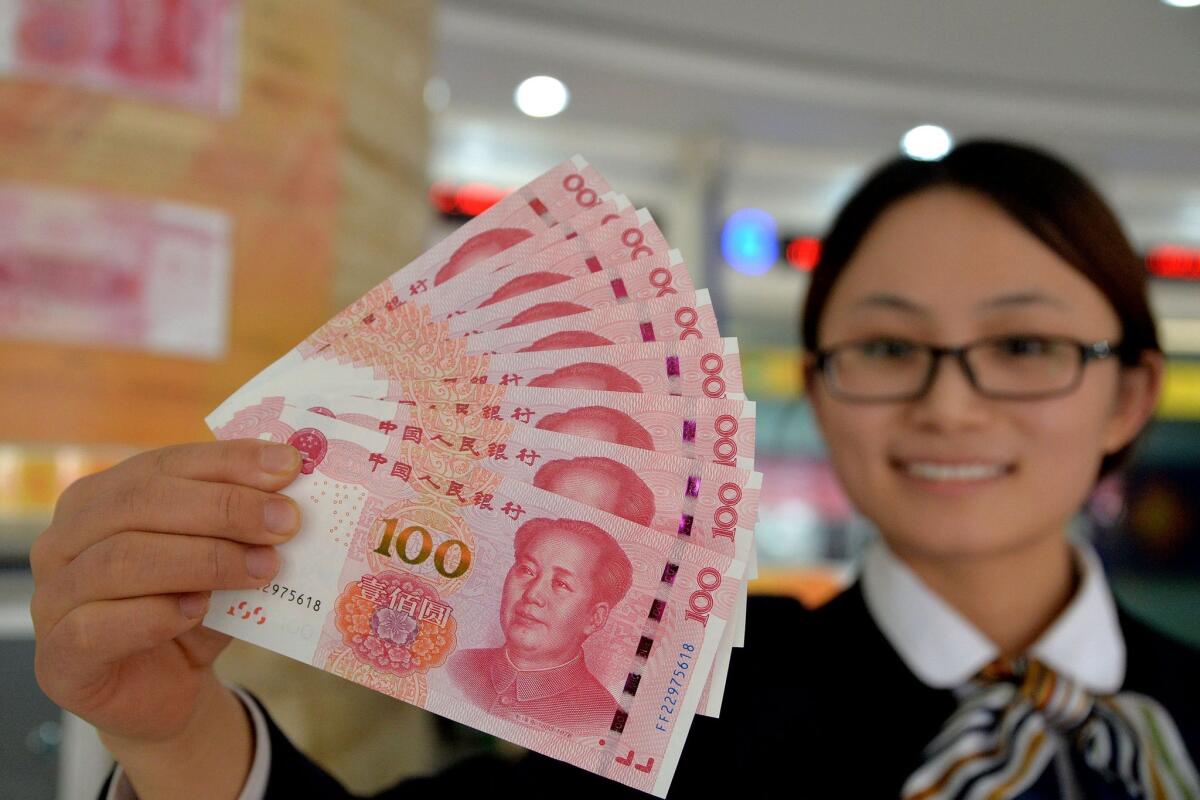As its money goes global, can China loosen up?

A bank employee shows new 100-yuan bank notes in Handan, in northern China’s Hebei province, on Nov. 12.
Reporting from Beijing — Ten days before the International Monetary Fund designated the Chinese renminbi an elite currency alongside the dollar, pound, euro and yen, Chinese authorities uncovered an underground bank in the eastern province of Zhejiang.
The bank, authorities said, had been violating currency restrictions that set a $50,000 limit on the money that Chinese citizens can move out of the country in a given year. It was no small player: It had handled $64 billion in “foreign exchange transactions,” state media said.
The crackdown on the bank — which included the unspecified punishment of 370 people, according to the state-run People’s Daily — points to some of the tensions gripping China as it further integrates with the global financial system. Currency transfers of the size that got the bank in trouble would be considered routine operating practice in many countries. But in China, the communist government is accustomed to exercising extraordinary control over financial transactions.
NEWSLETTER: Get the day’s top headlines from Times Editor Davan Maharaj >>
The question now is whether the IMF move will help push the world’s second-largest economy further down the road of liberalization and reform on exchange rates, interest rates, capital controls and other issues, giving the markets more of a role.
On Monday, the monetary agency announced that the renminbi, whose basic unit is the yuan, would be included in its so-called Special Drawing Rights basket, a designation that signifies a currency is “freely usable” – i.e. widely used and widely traded. Christine Lagarde, the fund’s managing director, called the move “an important milestone in the integration of the Chinese economy into the global financial system” and a recognition of the progress that China has made in reforming its monetary and financial systems.
But big gaps remain between China and the West.
China has “a unique financial market that has systematic state control and has largely been cut off from the international financial markets,” said Jeffrey Towson, a professor of investment at Peking University.
“Those connections are few and they are controlled,” he said. “That appears to be changing. I think the interesting question here is: If you give up control of the financial system, and effectively the renminbi, which internationalization would require, does that mean giving up control in other aspects of the economy?” In other words, he said, “can you have a freely floating renminbi without giving up a huge degree of control?”
The yuan remains far from a truly international currency, used far less frequently in global trade than the U.S. dollar. According to the global banking transaction organization SWIFT, in 2013, U.S. dollar transactions accounted for 81% of global trade, while transactions in yuan accounted for only 9%. By several other metrics, the yuan was even further behind.
Chinese state media trumpeted the IMF’s announcement as a major political victory and a high-level endorsement of the country’s recent economic reforms. Lagarde’s announcement “has won widespread applause,” wrote the state-run China Daily newspaper.
“The inclusion of the [yuan] in the SDR basket will increase the representativeness and attractiveness of the SDR, and help improve the current international monetary system, which will benefit both China and the rest of the world,” China’s central bank said in a statement.
“It also means that the international community expects China to play a bigger role in the international economic and financial system,” it said.
The new basket will be implemented in October 2016.
Michael Pettis, a finance professor at Peking University’s Guanghua School of Management, said including the renminbi in the SDR basket could in theory prompt China to “behave more responsibly” on matters of global trade.
“If you are part of the system, then you behave very differently than if you feel you are not part of the system,” he said. “So it makes sense to try as much as possible to pull China into all of these sort of corporate governance frameworks.”
But the move also signifies a shift in the world economic order. After the IMF’s announcement, the geopolitical consulting firm Stratfor noted that the yuan “has become the first SDR basket currency to belong to a country that is not a clear U.S. ally.”
“This is important because it is part of a wider trend, reflecting increased economic power in new parts of the world,” the firm said in a note.
Nevertheless, experts say the renminbi poses no imminent challenge to the U.S. dollar’s preeminent international profile.
“The renminbi is not taking on the U.S. dollar as a currency you want in your pocket while you’re on the backstreets of Nairobi any time soon,” said Fraser Howie, coauthor of “Red Capitalism: The Fragile Financial Foundation of China’s Extraordinary Rise.” “With the US dollar — the globe’s only international currency — you can go anywhere and have it accepted. The renminbi isn’t anywhere near getting that kind of status, and may never do so, frankly.
“I do not see a single-party dictatorship in Beijing ever freely floating the currency in the way that the U.S. dollar is freely traded,” he said. The current system “gives them tremendous ability to control money flows in and out of their country, either by Chinese or foreigners. Why would a country that controls information so tightly let its currency go free if hundreds of billions of dollars might flow out of China freely? Why on earth would they do that?”
To be sure, China has loosened some strictures; for example, Chinese tourists are now traveling the globe and able to spend so freely that they’ve buoyed economies from Paris to Southern California. And this year, China opened the Shanghai stock market to Hong Kong investors, and vice versa.
But as an increasing number of wealthy Chinese move overseas to escape endemic corruption, environmental degradation and political uncertainty at home — sending property prices from Los Angeles to Melbourne, Australia, skyrocketing — many have been forced to resort to the gray market and outright illegal workarounds to move their money overseas.
These citizens have found a plethora of ways to skirt the government’s capital controls: They smuggle cash across the border to Hong Kong; use credit cards to buy products abroad, then return them for cash; and perhaps most commonly, recruit friends and family members to move the money overseas for them, a workaround colloquially called “ants moving house.”
Two years ago, the People’s Daily reported that a 35-year-old man, referred to as Mr. Jin, bought a $3-million house in New York by recruiting 60 people — including the parents of high school classmates — to help him transfer the money into foreign accounts. Since then, authorities have been scrambling to close the loophole.
William H. Overholt, a senior fellow at the Harvard Asia Center and coauthor of the book “Renminbi Rising: A New Global Monetary System Emerges,” due out in January, said Chinese policymakers see the inclusion of the renminbi in the SDR and its growing internationalization as part of a broader push for domestic economic reform.
“They are using this as one more lever to push the domestic reform program,” he said. “The issue is really, are they able to get the whole reform package moving forward decisively? The reforms step on the toes of every major interest group — the state enterprises, the banks, the power of government officials and party officials to give licenses and charge for giving those licenses, the local governments.
“Having said that, each time they liberalize something, there is a potential problem. When they liberalize the renminbi, it depreciates and that creates risks with the U.S. When they start opening their stock market, and controlling it less, that creates more volatility.... They’ve discovered that, like all developing capital markets, when you open things up and you’re inexperienced at managing them, you get into some pretty interesting troubles.”
Nicole Liu in The Times’ Beijing bureau contributed to this report.
Twitter: @JRKaiman, @JulieMakLAT
MORE WORLD NEWS
Japan probes mystery boats carrying decomposing bodies drifting off its coast
U.S. Marine found guilty of killing transgender woman in the Philippines
AirAsia crash probe blames faulty rudder system, pilots’ response
More to Read
Sign up for Essential California
The most important California stories and recommendations in your inbox every morning.
You may occasionally receive promotional content from the Los Angeles Times.











